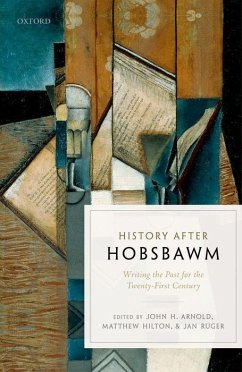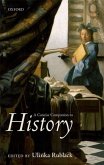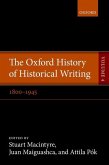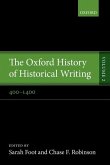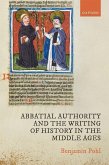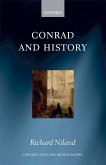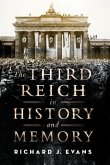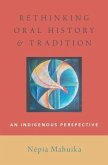History After Hobsbawm
Writing the Past for the Twenty-First Century
Herausgeber: Arnold, John H; Ruger, Jan; Hilton, Matthew
History After Hobsbawm
Writing the Past for the Twenty-First Century
Herausgeber: Arnold, John H; Ruger, Jan; Hilton, Matthew
- Gebundenes Buch
- Merkliste
- Auf die Merkliste
- Bewerten Bewerten
- Teilen
- Produkt teilen
- Produkterinnerung
- Produkterinnerung
An essay collection taking its cue from one of the twentieth century's greatest historians, Eric Hobsbawm, this book asks what it is to be a twenty-first-century historian, attempts to help society understand 'how we got here', and introduces some of the most exciting new lines of research in subjects from the medieval period to the present.
Andere Kunden interessierten sich auch für
![Concise Companion to History Concise Companion to History]() Ulinka RublackConcise Companion to History73,99 €
Ulinka RublackConcise Companion to History73,99 €![The Oxford History of Historical Writing: Volume 4: 1800-1945 The Oxford History of Historical Writing: Volume 4: 1800-1945]() The Oxford History of Historical Writing: Volume 4: 1800-1945245,99 €
The Oxford History of Historical Writing: Volume 4: 1800-1945245,99 €![The Oxford History of Historical Writing The Oxford History of Historical Writing]() Sarah FootThe Oxford History of Historical Writing242,99 €
Sarah FootThe Oxford History of Historical Writing242,99 €![Abbatial Authority and the Writing of History in the Middle Ages Abbatial Authority and the Writing of History in the Middle Ages]() Benjamin PohlAbbatial Authority and the Writing of History in the Middle Ages173,99 €
Benjamin PohlAbbatial Authority and the Writing of History in the Middle Ages173,99 €![Conrad and History Conrad and History]() Richard NilandConrad and History174,99 €
Richard NilandConrad and History174,99 €![The Third Reich in History and Memory The Third Reich in History and Memory]() Richard J EvansThe Third Reich in History and Memory27,99 €
Richard J EvansThe Third Reich in History and Memory27,99 €![Rethinking Oral History and Tradition Rethinking Oral History and Tradition]() MahuikaRethinking Oral History and Tradition104,99 €
MahuikaRethinking Oral History and Tradition104,99 €-
-
-
An essay collection taking its cue from one of the twentieth century's greatest historians, Eric Hobsbawm, this book asks what it is to be a twenty-first-century historian, attempts to help society understand 'how we got here', and introduces some of the most exciting new lines of research in subjects from the medieval period to the present.
Produktdetails
- Produktdetails
- Verlag: Oxford University Press, USA
- Seitenzahl: 352
- Erscheinungstermin: 3. Februar 2018
- Englisch
- Abmessung: 241mm x 156mm x 30mm
- Gewicht: 699g
- ISBN-13: 9780198768784
- ISBN-10: 0198768788
- Artikelnr.: 48500321
- Verlag: Oxford University Press, USA
- Seitenzahl: 352
- Erscheinungstermin: 3. Februar 2018
- Englisch
- Abmessung: 241mm x 156mm x 30mm
- Gewicht: 699g
- ISBN-13: 9780198768784
- ISBN-10: 0198768788
- Artikelnr.: 48500321
John H. Arnold studied at the University of York, and worked firstly at the University of East Anglia, and then for a number of years at Birkbeck, University of London, before taking up the chair of medieval history at Cambridge in 2016. He works on medieval culture and religion, and on various aspects of modern historiography. He is the author, among many other things, of History: A Very Short Introduction (2002). Matthew Hilton is Professor of Social History at Queen Mary University of London. He has published widely on the history of charities, social activism, consumption, and NGOs. His most recent books are Prosperity for All: Consumer Activism in an Era of Globalisation (2009) and The Politics of Expertise: How NGOs Shaped Modern Britain ( 2013). He has co-edited several collections of essays, including The Ages of Voluntarism (2011) and Transnationalism and Contemporary Global History (2013) and Cultural Studies Fifty Years On (2016). Jan Rüger is Professor of History at Birkbeck, University of London. He is the author of The Great Naval Game: Britain and Germany in the Age of Empire (2007) and Heligoland: Britain, Germany and the Struggle for the North Sea (2017).
* INTRODUCTION
* 1: John H Arnold, Matthew J Hilton, and Jan Rüger: The Challenges of
History
* I. NATION AND EMPIRE
* 2: Catherine Hall: Gendering Property, Racing Capital
* 3: Jan Rüger: Writing Europe into the History of the British Empire
* 4: Renaud Morieux: Indigenous Comparisons
* 5: John Breuilly: Hobsbawm and Researching the History of Nationalism
* 6: Bill Schwarz: Decolonisation as Tragedy
* II. MATERIAL ECONOMIES
* 7: Chris Wickham: Jiangnan style: doing global economic history in
the medieval period
* 8: Maxine Berg: Global history and the transformation of early modern
Europe
* 9: Pat Hudson: Industry, Working Lives, Nation and Empire, viewed
through some key Welsh woollen objects
* 10: Paul Warde: Social and environmental history in the Anthropocene
* 11: Frank Trentmann: Material Histories of the World: Scales and
Dynamics
* III. PEOPLE AND POLITICS
* 12: Andy Wood: Five swans over Littleport: fenland folklore and
popular memory, c. 1810-1978
* 13: Sonya Rose and Sean Brady: Rethinking Gender and Labour History
* 14: Yasmin Khan: Postcolonial History as War History in the Twentieth
Century
* 15: Jon Lawrence: The People's History and the Politics of Everyday
Life since 1945
* 16: Alison Light: A Visit to the Dead: Genealogy and the Historian
* CONCLUSION
* 17: Geoff Eley: A 'Slight Angle to the Universe': Eric Hobsbawm,
Politics, and History
* Index
* 1: John H Arnold, Matthew J Hilton, and Jan Rüger: The Challenges of
History
* I. NATION AND EMPIRE
* 2: Catherine Hall: Gendering Property, Racing Capital
* 3: Jan Rüger: Writing Europe into the History of the British Empire
* 4: Renaud Morieux: Indigenous Comparisons
* 5: John Breuilly: Hobsbawm and Researching the History of Nationalism
* 6: Bill Schwarz: Decolonisation as Tragedy
* II. MATERIAL ECONOMIES
* 7: Chris Wickham: Jiangnan style: doing global economic history in
the medieval period
* 8: Maxine Berg: Global history and the transformation of early modern
Europe
* 9: Pat Hudson: Industry, Working Lives, Nation and Empire, viewed
through some key Welsh woollen objects
* 10: Paul Warde: Social and environmental history in the Anthropocene
* 11: Frank Trentmann: Material Histories of the World: Scales and
Dynamics
* III. PEOPLE AND POLITICS
* 12: Andy Wood: Five swans over Littleport: fenland folklore and
popular memory, c. 1810-1978
* 13: Sonya Rose and Sean Brady: Rethinking Gender and Labour History
* 14: Yasmin Khan: Postcolonial History as War History in the Twentieth
Century
* 15: Jon Lawrence: The People's History and the Politics of Everyday
Life since 1945
* 16: Alison Light: A Visit to the Dead: Genealogy and the Historian
* CONCLUSION
* 17: Geoff Eley: A 'Slight Angle to the Universe': Eric Hobsbawm,
Politics, and History
* Index
* INTRODUCTION
* 1: John H Arnold, Matthew J Hilton, and Jan Rüger: The Challenges of
History
* I. NATION AND EMPIRE
* 2: Catherine Hall: Gendering Property, Racing Capital
* 3: Jan Rüger: Writing Europe into the History of the British Empire
* 4: Renaud Morieux: Indigenous Comparisons
* 5: John Breuilly: Hobsbawm and Researching the History of Nationalism
* 6: Bill Schwarz: Decolonisation as Tragedy
* II. MATERIAL ECONOMIES
* 7: Chris Wickham: Jiangnan style: doing global economic history in
the medieval period
* 8: Maxine Berg: Global history and the transformation of early modern
Europe
* 9: Pat Hudson: Industry, Working Lives, Nation and Empire, viewed
through some key Welsh woollen objects
* 10: Paul Warde: Social and environmental history in the Anthropocene
* 11: Frank Trentmann: Material Histories of the World: Scales and
Dynamics
* III. PEOPLE AND POLITICS
* 12: Andy Wood: Five swans over Littleport: fenland folklore and
popular memory, c. 1810-1978
* 13: Sonya Rose and Sean Brady: Rethinking Gender and Labour History
* 14: Yasmin Khan: Postcolonial History as War History in the Twentieth
Century
* 15: Jon Lawrence: The People's History and the Politics of Everyday
Life since 1945
* 16: Alison Light: A Visit to the Dead: Genealogy and the Historian
* CONCLUSION
* 17: Geoff Eley: A 'Slight Angle to the Universe': Eric Hobsbawm,
Politics, and History
* Index
* 1: John H Arnold, Matthew J Hilton, and Jan Rüger: The Challenges of
History
* I. NATION AND EMPIRE
* 2: Catherine Hall: Gendering Property, Racing Capital
* 3: Jan Rüger: Writing Europe into the History of the British Empire
* 4: Renaud Morieux: Indigenous Comparisons
* 5: John Breuilly: Hobsbawm and Researching the History of Nationalism
* 6: Bill Schwarz: Decolonisation as Tragedy
* II. MATERIAL ECONOMIES
* 7: Chris Wickham: Jiangnan style: doing global economic history in
the medieval period
* 8: Maxine Berg: Global history and the transformation of early modern
Europe
* 9: Pat Hudson: Industry, Working Lives, Nation and Empire, viewed
through some key Welsh woollen objects
* 10: Paul Warde: Social and environmental history in the Anthropocene
* 11: Frank Trentmann: Material Histories of the World: Scales and
Dynamics
* III. PEOPLE AND POLITICS
* 12: Andy Wood: Five swans over Littleport: fenland folklore and
popular memory, c. 1810-1978
* 13: Sonya Rose and Sean Brady: Rethinking Gender and Labour History
* 14: Yasmin Khan: Postcolonial History as War History in the Twentieth
Century
* 15: Jon Lawrence: The People's History and the Politics of Everyday
Life since 1945
* 16: Alison Light: A Visit to the Dead: Genealogy and the Historian
* CONCLUSION
* 17: Geoff Eley: A 'Slight Angle to the Universe': Eric Hobsbawm,
Politics, and History
* Index

